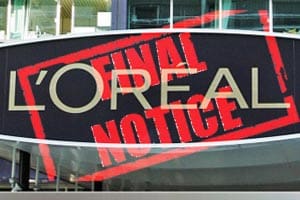
The Food and Drug Administration (FDA) has warned cosmetic giant L’Oréal, for the second time in three years, about improper marketing of skin care products. Cosmetic products are not subject to the same scrutiny and regulation as drugs, but cosmetics are limited in the types of claims they can make to consumers, according to Regulatory […]

FDA-Warns L’Oréal – Improper Marketing of Skin Care Products
The Food and Drug Administration (FDA) has warned cosmetic giant L’Oréal, for the second time in three years, about improper marketing of skin care products.
Cosmetic products are not subject to the same scrutiny and regulation as drugs, but cosmetics are limited in the types of claims they can make to consumers, according to Regulatory Focus (from Regulatory Affairs Professionals Society). Federal law describes cosmetics as products “intended to be rubbed, poured, sprinkled or sprayed on, introduced into or otherwise applied to the human body … for cleansing, beautifying, promoting attractiveness or altering the appearance.” Cosmetics are not intended to heal, cure or otherwise affect the body’s structure or function. But if a product is marketed for a therapeutic use, such as treating or preventing disease, it is a drug under the law.
In a February 2015 warning letter to L’Oreal, the FDA said two of the company’s products—Rosaliac AR Intense and Mela-D Pigment Control—had been marketed in such a way as to make them drugs under the Food, Drug and Cosmetic Act, Regulatory Focus reports. The FDA cited as improper claims that the products could reduce “visible redness and sensations of discomfort” and “treat dark spots and discolorations.” These claims, the FDA explained, imply the products could be used in the “cure, mitigation, treatment or prevention of disease,” specifically, the skin condition rosacea. The FDA said the Rosaliac AR Intense product, in particular, was marketed to patients with rosacea—a condition “not amenable to self diagnosis.” The FDA said the company needs to “take prompt action to correct the violations” cited in the warning letter, according to Regulatory Focus.
In 2012, L’Oreal subsidiary Lancôme USA received a warning letter for allegedly marketing products using claims that caused them to be considered drugs under the federal Food, Drug and Cosmetic Act.


